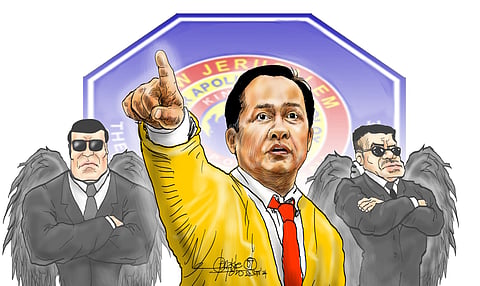
- NEWS
- the EDIT
- COMMENTARY
- BUSINESS
- LIFE
- SHOW
- ACTION
- GLOBAL GOALS
- SNAPS
- DYARYO TIRADA
- MORE

The so-called “Angels of Death” associated with Pastor Apollo Quiboloy, the controversial leader of the Kingdom of Jesus Christ (KoJC), have become a focal point of disturbing allegations that connect his religious empire to a range of abuses, including human trafficking, rape and coercion.
If the claims about this shadowy group are true, they raise serious concerns about the role of such organizations in perpetuating a culture of fear and control, especially over vulnerable individuals, often young women, within the sect.
These accusations, if substantiated, could significantly bolster the case against Quiboloy regarding human trafficking and sexual abuse.
The self-proclaimed “Appointed Son of God” has long courted controversy with his claims of divine authority and control over his global religious empire. However, the accusations surrounding his private army of “Angels of Death” introduce a much darker and more troubling dimension to his operations.
Former members of KoJC have come forward with allegations that these so-called “angels” serve as enforcers, tasked with ensuring obedience within the ranks of the church, particularly among the women whom Quiboloy allegedly keeps under his control. Their alleged role is not just to maintain order but to instill fear — silencing dissent, quashing rebellion and ensuring that those who are trapped in Quiboloy’s religious system do not escape or speak out against him.
These “Angels of Death” reportedly operate as a secretive, loyal group within the church, capable of imposing both physical and psychological harm on those who do not comply with Quiboloy’s wishes.
The very name — “Angels of Death” — suggests a level of intimidation and power that goes beyond mere spiritual guidance. The allegations paint a picture of an organization that functions as a private army, a weaponized wing of Quiboloy’s church used to coerce and control members, particularly vulnerable young women, whom Quiboloy has allegedly abused.
Testimonies from former KoJC members describe how these women are isolated, intimidated, and threatened by this private army, ensuring their silence and complicity.
If the “Angels of Death” are indeed part of an organized effort to terrorize and control women within KoJC, it lends substantial credibility to the accusations of human trafficking and sexual abuse that have been leveled against Quiboloy.
Prosecutors and human rights advocates argue that the use of intimidation tactics, especially when tied to a religious leader with vast influence and resources, creates the perfect environment for human trafficking.
Young women are allegedly recruited under the guise of religious service, only to find themselves subjected to exploitation, often unable to escape due to the threats posed by Quiboloy’s enforcers.
The connection between a private army and human trafficking is not new. Throughout history, authoritarian figures have used armed enforcers to maintain control over vulnerable populations, ensuring that they remain compliant and unable to seek help.
In Quiboloy’s case, the accusations suggest that his religious influence, combined with the physical and emotional threats posed by the “Angels of Death,” creates a closed system where victims are isolated from outside help. This bolsters the human trafficking case, as it demonstrates that the alleged victims were not free to leave and were subjected to ongoing coercion.
Furthermore, the role of these enforcers strengthens the accusations of rape and sexual assault against Quiboloy. If young women in the church were kept in line with threats of violence or death from the “Angels of Death,” then any sexual relationship they had with Quiboloy would clearly fall under the category of coercion, making the claims of rape much more plausible.
The psychological and physical control that these enforcers allegedly exert would create an environment where consent is impossible, as the threat of punishment hangs over any interaction.
In all, the allegations surrounding Quiboloy’s “Angels of Death” deepen the gravity of the human trafficking and rape accusations against him. It is crucial therefore for authorities to investigate these claims thoroughly, as the involvement of a private armed group significantly strengthens the case that Quiboloy has created a dangerous and abusive environment under the guise of religious leadership.
The victims, particularly the young women allegedly trapped in this system, deserve justice and protection from further harm.
